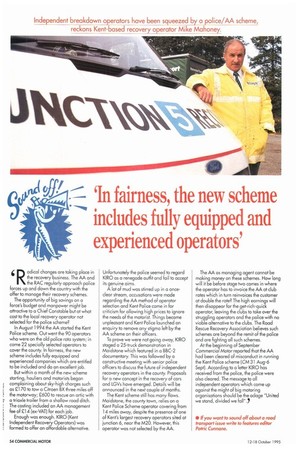'In fairness, the new scheme includes fully equipped and experienced operators'
Page 64

If you've noticed an error in this article please click here to report it so we can fix it.
gadical changes are taking place in R
the recovery business, The AA and the RAC regularly approach police forces up and down the country with the offer to manage their recovery schemes. The opportunity of big savings on a force's budget and manpower might be attractive to a Chief Constable but at what cost to the local recovery operator not selected for the police scheme?
In August 1994 the AA started the Kent Police scheme. Out went the 90 operators who were on the old police rota system; in came 22 specially selected operators to cover the county. In fairness, the new scheme includes fully equipped and experienced companies which are entitled to be included and do an excellent job.
But within a month of the new scheme starting, hauliers and motorists began complaining about sky-high charges such as 2170 to tow a Citroen BX three miles off the motorway; £600 to rescue on artic with a triaxle trailer from a shallow road ditch. The costing included an AA management fee of £14 (ex-VAT) for each job.
Enough was enough. KIRO (Kent Independent Recovery Operators) was Formed to offer an affordable alternative. Unfortunately the police seemed to regard KIRO as a renegade outfit and fail to accept its genuine aims.
A lot of mud was stirred up in a onceclear stream, accusations were made regarding the AA method of operator selection and Kent Police came in for criticism for allowing high prices to ignore the needs of the motorist. Things became unpleasant and Kent Police launched an enquiry to remove any stigma left by the AA scheme on their officers.
To prove we were not going away, KIRO staged a 25-truck demonstration in Maidstone which Featured in a BBC-2 documentary. This was followed by a constructive meeting with senior police officers to discuss the Future of independent recovery operators in the county. Proposals for a new concept in the recovery of cars and LGVs have emerged. Details will be announced in the next couple of months.
The Kent scheme still has many flaws. Maidstone, the county town, relies on a Kent Police Scheme operator covering from 14 miles away, despite the presence of one of Kent's largest recovery operators sited at junction 6, near the M20. However, this operator was not selected by the AA. The AA as managing agent cannot be making money on these schemes. How long will it be before stage two comes in where the operator has to invoice the AA at club rates which in turn reinvoices the customer at double the rate? The high earnings will then disappear for the get-rich-quick operator, leaving the clubs to take over the struggling operators and the police with no viable alternative to the clubs. The Road Rescue Recovery Association believes such schemes are beyond the remit of the police and are fighting all such schemes.
At the beginning of September Commercial Motor reported that the AA had been cleared of misconduct in running the Kent Police scheme (CM 31 Aug-6 Sept). According to a letter KIRO has received from the police, the police were also cleared. The message to all independent operators which come up against the might of big motoring organisations should be the adage "United we stand, divided we fall".




















































































































